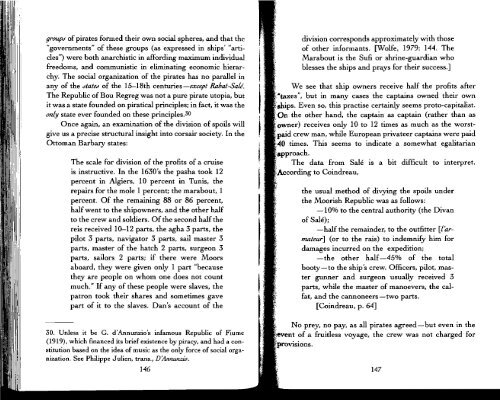You also want an ePaper? Increase the reach of your titles
YUMPU automatically turns print PDFs into web optimized ePapers that Google loves.
groupd ofpirates fonned their own social spheres, and that the<br />
"governments" of these groups (as expressed in ships' "articles")<br />
were both anarchistic in affording maximum individual<br />
freedoms, and communistic in eliminating economic hierarchy.<br />
The social organization of the pirates has no parallel in<br />
any of the tI/ateJ of the 15-18th centuries-e.xcept .Rabal-Sale.<br />
The Republic of Bou Regreg was not a pure pirate utopia,<br />
it was a state founded on piratical principles; in fact, it was the<br />
only state ever founded on these principles.50<br />
Once again. an examination of the division of spoils will<br />
give us a precise structural insight into corsair society. In the<br />
Ottoman Barbary states:<br />
The scale for division of the profits of a cruise<br />
is instructive. In the 1630's the pasha took 12<br />
percent in Algiers, 10 percent in Tunis, the<br />
repairs for the mole 1 percent; the marabout, 1<br />
percent. Of the remaining 88 or 86 percent,<br />
half went to the shipowners, and the other half<br />
to the crew and soldiers. Ofthe second half the<br />
reis received 10-12 parts, the agha.3 parts, the<br />
pilot .3 parts, navigator .3 parts, sail master .3<br />
parts, master of the hatch 2 parts, surgeon .3<br />
parts, sailors 2 parts; if there were Moors<br />
aboard, they were given only 1 part "because<br />
they are people on whom one does not count<br />
much." If any of these people were slaves, the<br />
patron took their shares and sometimes gave<br />
part of it to the slaves. Dan's account of the<br />
30. Unless it be G. d'Annunzio's infamous Republic of Fiume<br />
which llnanced its briefexistence by piracy, and had a constitution<br />
based on the idea ofmusic as the only force of social organization.<br />
See Philippe Julien, trans., D'Anrw.n.zio.<br />
146<br />
division corresponds approximately with those<br />
of other informants. [Wolfe, 1979: 144. The<br />
Marabout is the Sufi or shrine-guardian who<br />
blesses the ships and prays for their success.]<br />
We see that ship owners receive half the profits after<br />
"taxes", but in many cases the captains owned their own<br />
Even so, this practise certainly seems proto-capitalist.<br />
On the other hand, the captain as captain (rather than as<br />
-) receives only 10 to 12 times as much as the worstcrew<br />
man, while European privateer captains were paid<br />
times. This seems to indicate a somewhat egalitarian<br />
is a bit difficult to interpret.<br />
the usual method of divying the spoils under<br />
the Moorish Republic was as follows:<br />
-10% to the central authority (the Divan<br />
of Sale);<br />
-halfthe remainder, to the outfitter [Larmateur]<br />
(or to the rais) to indemnifY him for<br />
damages incurred on the expedition;<br />
-the other half-45% of the total<br />
booty-to the ship's crew. Officers. pilot. master<br />
gunner and surgeon usually received .3<br />
parts, while the master of manoevers, the calfat.<br />
and the cannoneers -two parts.<br />
(Coindreau, p. 64]<br />
No prey, no pay, as all pirates agreed-but even in the<br />
of a fruitless voyage, the crew was not charged for<br />
147


